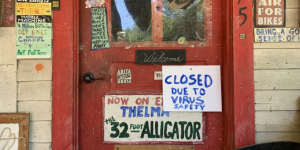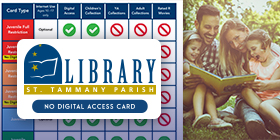
Last year was one for the books and the library's Genealogy Department has done what it does best with historical events. It has found a way to record the Covid-19 experience. Although the Covid-19 pandemic is still going on a year later and we are still finding ways to navigate the new normal among our losses, the COVID-19 Memory Project is a welcome outlet for sharing our stories and experiences of this occurrence with each other and with future generations.
Genealogy Librarian Leidy Cook organized the Covid-19 Memory Project, a two-phased oral history venture that is continuing along with the pandemic.
“We collected short interviews from parish residents over Zoom in the summer of 2020. This was an open-call; anyone could participate. These were each about fifteen minutes in length. We spoke to artists, teachers, homemakers, medical workers and other professionals about how they were coping during the pandemic and what their day-to-day was like. The second part of the project will be longer oral histories with first responders, health-care and front-line workers, political figures, etc. These will be 60-90 minutes in length. Once the full scope of the pandemic is clear, we will be better able to determine good interviewees for the longer oral histories,” said Cook.
“I wanted to start the project in order to document the COVID-19 pandemic as it has been experienced in St. Tammany. It is so easy for history to become a matter of government records and newspaper accounts, if there is no other documentation available. Oral histories are one way to document the lived, subjective experience of a moment in time, in a way that official records can't. Data can tell us, for example, how many cases St. Tammany has had over time, but it can't tell us what it was like to be a nurse treating COVID patients. Through oral histories, we can add to the historical record for the benefit of the community and future researchers.”
Many memorable experiences were shared, but Cook has had two especially memorable and poignant experiences with the project that have stuck with her.
“One of the respondents, a writer, told us that she had written a poem a day during lockdown, as a way to cope with the stress. She read us one of these poems and it was a really meaningful moment. Another respondent shared the experience of losing her mother to COVID and the strangeness and isolation of grieving during this time,” said Cook.
The project is not complete, Cook has plans to do longer oral histories and start on them later in the year.
“The COVID-19 Memory Project, when completed, will hopefully be an important resource for future generations to understand what the pandemic was like in St. Tammany,” said Cook.
The St. Tammany Genealogy Department’s upcoming events include Creating Family Archives a virtual discussion at 2 p.m. on March 12. Guest speaker Margot Note has written the book Creating Family Archives: A Step-by-Step Guide for Saving Your Memories for Future Generations. “In this webinar, patrons can learn the easy steps to take to organize and preserve what's meaningful to them,” said Cook.

